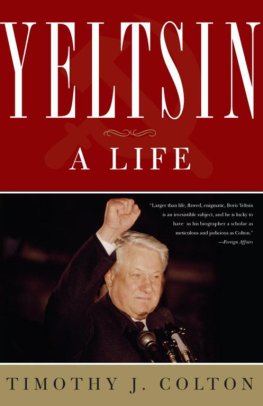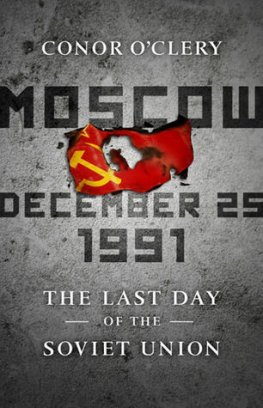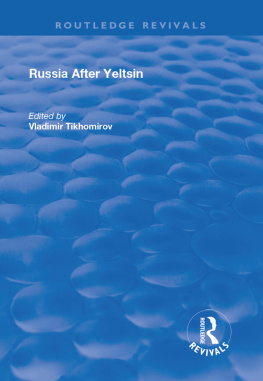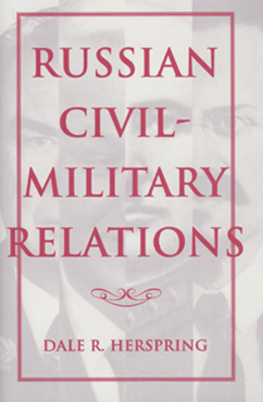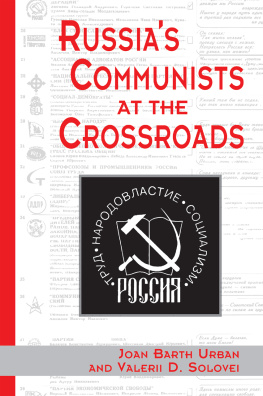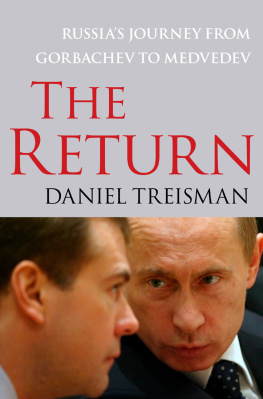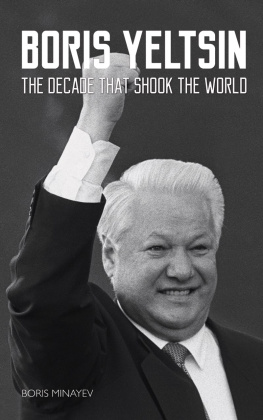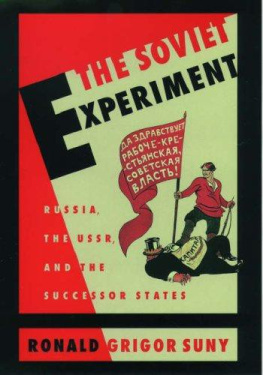Timothy J. Colton
YELTSIN
A Life
 Hero As Paradox
Hero As ParadoxAt twelve noon, Friday, December 31, 1999, Moscow time, on the cusp of the new year, the new century, and the new millennium, a surprise announcement from the presidents office was televised across Russia from the Baltic Sea, where the sun had crept above the horizon, to the Bering Strait, where it had just dipped below. Boris Yeltsin, attired in a charcoal-gray suit and silver tie, with a tinseled holiday tree in the background, had videotaped it that morning. He was retiring seven months before the expiration of his mandate, he said hoarsely, and was handing over power to the prime minister and now acting president, Vladimir Putin, pending confirmation by the electorate. As the terse clip rolled, the presidential suite, paraphernalia, and nuclear briefcase were already in Putins hands and Yeltsin was clinking glasses at a leave-taking luncheon.1
Most viewers could not help recall a telecast from the Kremlin eight winters earlier, at seven P.M. on Western Christmas, December 25, 1991.2 In that funereal tableau, Mikhail Gorbachev, the resolute liquidator of the Cold War and the Iron Curtain and the irresolute reformer of communism, declared his resignation from the presidency of the Soviet Union and, with utmost reluctance, his acquiescence in unraveling the once mighty union itself. He abdicated to the same human being who would star in the 1999 presentation.
The uncanny thing is that vanquisher and vanquished, Yeltsin and Gorbachev, had so much in common. They came into the world twenty-nine days apart in 1931, Yeltsin on the first day of February and Gorbachev on the second of March. They were born to lowly parents in out-of-the-way villages on the Russian perimeterat the fringe of the craggy Urals, almost in Siberia, for Yeltsin, and on the Caucasus isthmus, between the Caspian and the Black seas, for Gorbachevat a time when those communities were hungry and under siege by the communist regime. Regardless, as grown men they served the regime and carved out vocations in its core as apparatchiks, members of the administrative machine of the Communist Party of the Soviet Union (CPSU).3 In the 1980s they strained every sinew to reform that machine: Gorbachev, in the top job as general secretary, recruited Yeltsin to a senior post for that very purpose. How odd, then, for them to wind up on either side of the barricades in 1991. And so they would remain until Yeltsins death sixteen years after.
In 1999 Yeltsin began his valedictory on a sunny note. He commended the constitutionally correct transfer of power and the advances in political, economic, and cultural freedoms while he was head of state, all running against the grain of Russias autocratic heritage. The solid showing of pro-government candidates in the recent parliamentary election had left him confident he could bow out in peace. I have attained the goal of my life: Russia will never return to the past, Russia from now on will proceed only forward.4
In midstream, though, Yeltsin switched gears and delivered a curiosity for any politiciana mea culpa:
I would like to say a few words more personal than I am accustomed to saying. I want to apologize to you. I beg your forgiveness for not making many of your and my dreams come true. What seemed simple to do proved to be excruciatingly difficult. I beg your forgiveness for not vindicating some of the hopes of those who believed that in one leap, with one stroke, we could jump from the gray, stagnant, totalitarian past into a cloudless, prosperous, and civilized future. I myself believed this. I thought we could overcome everything in one go.
One leap was not enough to do it. I was in certain respects nave. Some problems revealed themselves to be exceptionally complicated. We slogged ahead through trial and error. Many people were shaken by these trying times.
But I want you to know what I have never spoken about before and what it is important for me to say today. The pain of each of you called forth pain in me and in my heart. I went through sleepless nights and torturous self-doubts about what to do so that people might live easier and better. For me no task outweighed this.
I am departing. I did all I could do.5
For anyone wishing to retrace the Yeltsin saga, his soul-baring farewell raises as many questions as it answers. It stays away from how he, a child of totalitarianism, got to dismantle it, and whether the project was quixotic or feasible. It does not offer a scoresheet of his or the other players experience in government. If the exercise to date had been that torturous, it does not tell why Russians should have been hopeful about going forward.
In the library on the transition from Soviet-type communism, the Yeltsin bookshelf is slender. Almost all the works on it by Westerners were written before he stepped down, some long before; none was done with access to him; and together they miss out on the submerged nine-tenths of the personality iceberg.6 In Russia, no writer has so much as attempted an authoritative life of Yeltsin. As was bemoaned on his penultimate birthday in 2006, the existing publications are politicized and maudlin and often slip into opinion pieces [publitsistika] not of the highest order.7
Why this apathy? In Yeltsins native land, biography has never been a mainstream art form or the halfway house between academic and popular history that it is in the West.8 It was frowned upon under communism as irreconcilable with the struggle between monolithic social classes outlined by Marx and Engels in the Communist Manifesto. Poking into any Soviet citizens life and provenanceexposing details like socioeconomic, religious, and ethnic lineage, accusations against a relative, hidden enthusiasms or grudgeswas treacherous for the subject. In post-Soviet Russia, biography and the search for roots are more in vogue. But books on political figures, at least so far, tend toward gimcrack sensationalism and the regurgitation of press clippings. As for Yeltsin, official attitudes cooled after Putin took over, and popular interest waned. A Russian would have thought twice about undertaking a serious tome on Yeltsin and would have been hard-pressed to get inside information about him.9
In the West, it has been suggested that Yeltsin scared authors off because he was sui generis and so hulking a presence.10 This argument does not pass muster. Historians have not ignored such unique, outsized figures as Washington, Lincoln, Churchill, and Hitler.11
The inverse possibility is not readily brushed aside. Maybe all individual actors would be insignificant in a scene scoured by large-scale social and political forces, as this one was. Yeltsin pointed out in Presidential Marathon, the last in his trilogy of memoirs, that as paramount leader he did not fly solo. Much of what occurred depended on my actions, right or wrong, he averred. But in the end history is not written by individuals. There are general and sometimes cryptic patterns in the lives of nations.12
The surreal events that ripped asunder a superpower are comparable to angry eruptions in the natural world. Mere interrogation of Soviet officialdoms political monopoly in the late 1980s was for a snugly encased society as if a meteorite had hit the planet, after which the climate changed and floods and earthquakes broke out, wrote a Moscow essayist.13 The passing of the Soviet partocracy in 1991, a nanosecond in political time, has been equated with the extinction of the dinosaurs. A communist bloc guided in varying degrees by the USSR was omnipresent in the affairs of the twentieth century. As a Berkeley professor wrote in 1992, We have thought in terms of East and West, and now there is no East as such.14

